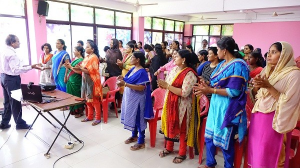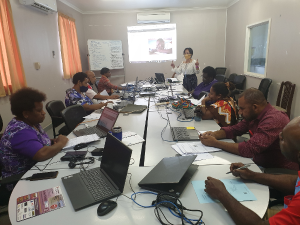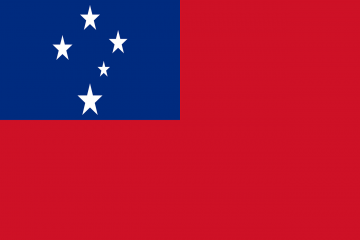March 2021 marks the 10th anniversary of an innovative approach to provide free, and open, media and information literacy education at the Open Education Resource Foundation (OERF).
Our journey commenced in 2011 with a wiki-based short course evolving into the award winning series of the Learning in a Digital Age (LiDA) micro-courses now incorporated into post-secondary qualifications around the world. In support of the Pacific Partnership for Open, Distance, and Flexible Learning, the Commonwealth of Learning commissioned the OERF to expand its open online delivery model to develop and host the inaugural offering of the Digital skills for OER Sharing course for school teachers.

A community volunteer facilitating an awareness campaign for the LiDA courses in Kerala, India on Women’s Day, 2018.
To date, the OERF’s digital media and information literacy open course initiatives have supported over 12,500 registered learners from over 90 different countries in formal, non-formal, and informal learning contexts. With all learning materials published as open educational resources (OER), learners can study for free without the need to purchase textbooks. Published and delivered using Free and Open Source Software (FOSS), any institution can reuse, remix, and replicate the course materials for their own purposes.
Course origins
In January 2011, the OER Foundation initiated the collaborative development of the Open Content Licensing for Educators (OCL4Ed) micro-course. With funding support from the UNESCO Office for the Pacific States, the course was originally developed and hosted in an open wiki, with contributions from volunteers in the WikiEducator community, the OpenCourseWare Consortium (now Open Education Global (OEGlobal)), and Creative Commons. Providing a practical introduction to the world of copyright, OER, and Creative Commons licences, the course was designed to empower educators to legally remix open education materials and help their institutions to take informed decisions about open content licensing.
Commencing in March 2011, six cohort offerings of the wiki-based course were facilitated by the OER Foundation until 2014, supporting 3,049 registered learners from more than 90 different countries. Underpinned by the FOSS practice of “release early, release often”, this phase of the project gave the OERF and its partners opportunities to refine the course activities and materials in response to the needs of learners.
Evolution of courses
Drawing on this experience, the OER Foundation identified a number of shortcomings in this initial iteration of the course. Many learners were not familiar with navigating wiki-based courses. Replicating the course for re-use by different institutions would be cumbersome, and there were no assessment or credential options for formal academic credit. Moreover, as a standalone micro-course equating to 40 notional learning hours, OCL4Ed was not of sufficient scope to qualify for full course credit.
In 2015, the OERu international network therefore commenced development of the Learning in a Digital Age (LiDA) online course, encompassing OCL4Ed and other aspects of digital information literacy required for 21st century learning and teaching. An international network of experts and professional educators worked together to investigate course outlines from similar university courses, and identify the foundational requirements for the LiDA curriculum. This included an open crowdsourcing activity inviting educators to submit comments and concepts for inclusion. This work resulted in the creation of a collection of four openly licensed micro-courses supplemented by a new course designed specifically for school teachers:
- Digital literacies for online learning (LiDA101)
- Digital citizenship (LiDA102)
- Open education, copyright, and open licensing in a digital world (LiDA103)
- Critical media literacies and associated digital skills (LiDA104)
- Digital skills for OER sharing (DS4OERS)
Pedagogical approach and quality
The pedagogy underpinning the micro-courses, embracing active learning and open educational practices, is itself designed to promote digital information literacy skills and OER capacity. It offers learners both a pathway towards independent learning through the internet and encouragement to create their own openly licensed digital media. The courses utilise an OER-enabled ‘pedagogy of discovery’ where learners are supported to search, find, and evaluate open access resources in pursuit of their own learning interests.

Blended learning session of the DS4OERS course conducted by the Flexible, Open, and Distance Education Unit of the Department of Education, Papua New Guinea
In 2019, LiDA was presented with the Commonwealth of Learning Award for Excellence in Distance Education Materials. During 2021, the New Zealand Qualifications Authority has evaluated the Learning in a Digital Age (Micro-credential) delivered by OERu and assessed its equivalency on the New Zealand Qualifications Framework.
Adoption and adaptation
Developed and published as OER, the OERF’s online media and information literacy courses have been adopted and adapted for multiple reuse contexts:
- Otago Polytechnic in New Zealand has offered LiDA as a self-directed elective course in three of its undergraduate programmes since July 2019.
- Western Pacific University in Papua New Guinea has introduced LiDA as a required foundation course for all its students, who again access it directly from the OERu site.
- Thompson Rivers University in Canada recognises credit transfer of the LiDA courses towards their Certificate of General Studies.
- The Institute for Open and Distance Learning located within the College of Education at the University of South Africa (Unisa) led the response in digital literacy capacity development among in-service teachers during the initial COVID-19 lockdown in South Africa using the LiDA courses in 2020.
- The OERF is currently collaborating with OEGlobal to host an instance of the Open Education, Copyright, and Open Licensing course on OEGlobal’s own course website replicating OERF’s FOSS infrastructure.
- The International Council for Open and Distance Education (ICDE) headquartered in Norway, working in partnership with UNESCO and the French Online University (L’Université Numérique), led the French translation of the OERu’s micro-course, Open education, copyright, and open licensing in a digital world (LiDA103). This micro-course is now available in French to support capacity development in Francophone Africa.
Conclusion
This post has charted the 10-year evolution of open online courses supporting information literacy education into an acclaimed set of micro-courses on learning in a digital age, which has been recognised internationally through micro-credentials and formal university credit. Its current stage of expansion is demonstrating how the OER Foundation’s long-standing commitment to openness in all its forms has secured a pathway for context-appropriate adoption and adaptation. Meanwhile, the ongoing process of refining and adapting the course, both pedagogically and technically, itself continues to develop the capacity, and the passion, of the individuals and institutions involved.
Attributions:
Image: Lida awareness session in Kerala by Sebastian Panakal, published under CC-BY-SA license.
Image: Papua New Guinea DS4OER class by Flexible, Open and Distance Education Unit, of the Department of Education, published under CC-BY-SA license.
Image: Social media and smartphone by Geralt, dedicated to the public domain.
Text: Adapted from presentation: Radical openness, incremental design: Maximising the reach of OER capacity development through open principles by C.Goode, W. Mackintosh & S. Wood, presented at OE Global 2021 Online Conference, published under CC-BY-SA license.

